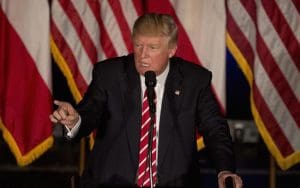Trump's campaign of intimidation against the press escalates
In a radio interview with Hugh Hewitt, incoming White House Chief of Staff Reince Priebus continued President-elect Donald Trump’s pattern of chilling and intimidating the press by expressing amenability to a range of dangerous ideas — including hinting that the White House daily briefings might not even be necessary in its current form and the possibility […]

In a radio interview with Hugh Hewitt, incoming White House Chief of Staff Reince Priebus continued President-elect Donald Trump’s pattern of chilling and intimidating the press by expressing amenability to a range of dangerous ideas — including hinting that the White House daily briefings might not even be necessary in its current form and the possibility of a Donald Trump Friday morning “drive time” radio show (emphasis mine):
HH: (I)nstead of that boring Saturday morning radio address, I think the President should do a Friday morning drive time nationally syndicated show each week, you know, in the morning when you can shape news. Don’t you agree?
RP: Well, you know, what? Look, I think that many things have to change, and I think that it’s important that we look at all of those traditions that are great, but quite frankly, as you know, don’t really make news…
HH: No.
RP: And they’re just sort of…
HH: It’s horrible.
RP: …mundane, boring episodes. And you know, even looking at things like the daily White House briefing from the press secretary, I mean, there’s a lot of different ways that things can be done, and I can assure you we’re looking at that.
HH: And that brings me, Glenn Thrush on Wednesday said there is worry in the White House Press Corps that they’re going to do away with the traditional bullpen, the upstairs, the downstairs. Now I do want the front row given over to Salem Media, but what do you, what are the plans for the press corps and that traditional approach?
RP: We’re, and I hate blowing things off, because I’m not doing it on purpose, it just so happens that we’re actually talking about those things right now. And what the new tradition, I guess you could say, should be in the Trump White House. You know, this was the first front row assigned seat issue, as I understand it, started in the Obama administration. In the Bush administration, you just took a seat, and I guess there were a couple of people that have had reserved spots. But for the most part, the more formalized reserved seating piece came in over the last eight years. That issue is being talked about. The point of all of this conversation is that the traditions, while some of them are great, I think it’s time to revisit a lot of these things that have been done in the White House, and I can assure you that change is going to happen, even on things that might seem boring like this topic…
Priebus is dead wrong about assigned seating, which dates back to the Reagan administration, and which is controlled by the White House Correspondents’ Association.
He is also dangerously wrong about daily briefings and workspaces for reporters being mere “traditions.” These are longstanding agreements that are negotiated by the WHCA, based on bedrock journalistic principles.
Priebus’ statements here are a clear shot across the bow of the free press, and the White House press in particular. By putting everything on the table, even the very existence of the White House beat as we currently know it, the Trump administration is laying down a marker for the kind of access that the WHCA will be able to negotiate.
The idea of a syndicated weekly Trump radio show, aside from the substantive outrage of such a despotic indoctrination hour, is also an apparent warning to the press that if they thought Obama was trying to get around them (which they absurdly did), they are about to see what that truly looks like.
And in the Trump age, the WHCA will be bargaining from a point of historic weakness, since the voters Trump cares about tend to be incredibly hostile toward the corporate media, inflamed by Trump’s repeated attacks on the press.
Trump continues to remind members of the press that he will intimidate them personally at the slightest provocation. When Vanity Fair opined that Trump Grill “could be the worst restaurant in America,” Trump responded with a tweet:
Has anyone looked at the really poor numbers of @VanityFair Magazine. Way down, big trouble, dead! Graydon Carter, no talent, will be out!
— Donald J. Trump (@realDonaldTrump) December 15, 2016
Once again, Trump uses his Twitter feed as a distraction, hoping to direct attention away from news of Russian interference in the election and his knowledge thereof. And yet the content of his tweet is itself chilling, as is ever the case.
The message of this campaign of intimidation is clear and unambiguous: there will be “consequences” for anyone who criticizes Trump.
That message appears to be sinking in with at least some of The New York Times’ staff, whose executives met privately with Trump a few weeks ago. They have recently been parroting unfounded Trump talking points about job creation, and in reporting on a meeting with tech company executives that most outlets flagged over the Trump children’s participation, the Times’ headline reads more like a Trump transition press release: “‘I’m Here to Help,’ Trump Tells Tech Executives at Meeting.”
When the Times finally got around to reporting on the presence of Trump’s kids (in paragraph seven), it received the merest of mentions:
In another sign of Mr. Trump mixing family, business and government hats, three of his adult children — Donald Jr., Ivanka and Eric — also attended.
You say “hat-mixing,” I say “outrageous conflict that threatens the interests of the American people.” Tomato, tomahto.
The media will have to decide if their journalistic ethics matter more than their fear of being labeled as partisan, and thus if they will fight Trump’s attempts to intimidate and marginalize them.
The failures of the corporate media were numerous in the run-up to Trump’s electoral college victory, but they still have a critically important role to play. The White House press corps is charged with holding the president accountable on behalf of the American people, a job at which they may not always excel but which they certainly cannot even do if they are not there.
Recommended

Biden campaign launches new ad focused on Affordable Care Act
Former President Trump has said he wants to do away with the popular health care law.
By Kim Lyons, Pennsylvania Capital-Star - May 08, 2024
Trump leaves door open to banning medication abortion nationwide
Donald Trump is planning to release more details in the weeks ahead about how his administration would regulate access to medication abortion, according to comments he made during a lengthy interview with Time magazine published Tuesday.
By Jennifer Shutt, States Newsroom - April 30, 2024
Biden on abortion rights: President expects to give speech Tuesday on new Florida 6-week ban
‘Having the president of the United States speaking out loud and with confidence about abortion access is a great thing’
By Mitch Perry, Florida Phoenix - April 22, 2024












































































